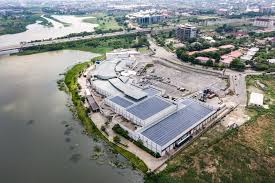The Federal Government has pledged its commitment to collaborate with stakeholders in the clean up of Jabi Lake located in Abuja.
Bello Muhammad Goronyo, Minister of State for Water, Resources, and Sanitation, made the pledge during a progress report presentation at the Ministry’s Conference room in Abuja.
A statement on Friday issued by Mrs.Funmi Imuetinyan, Director, Press and Public Relations, Federal Ministry of Water Resources and Sanitation, quoted the minister as expressing concern over the diminishing eco-hydrological value of the lake, attributing it to encroachment by miscreants and vandals.
Goronyo emphasised the urgency of halting unauthorised activities threatening the water body and its ecosystem to preserve it for future water supply and demand.
While highlighting the challenges faced by the Eco-hydrology research team, Goronyo stated that increased building structures around the lake hinder access to its shorelines.
He assured stakeholders of his commitment to reaching out and collaborating with stakeholders to address these threats and protect Jabi Lake.
In his presentation, Professor E.A. Adanu, Chairman of the Regional Center for Integrated River Basin Management, emphasised the importance of addressing identified threats and security challenges in the Jabi area.
Dr. Sani Dauda Ahmed, Coordinator of Training and Education at RC-IRBM Project Desk Office, provided updates on research and capacity building in Eco-hydrology and Integrated Water Resources Management (IWRM) on Jabi Lake during his presentation.
He revealed that Jabi Lake, faces escalating threats due to the rapid increase in urbanisation and socio-economic activities in its vicinity, adding that this poses a significant risk to the Lake and its delicate ecosystem.
He noted that recognising the urgency of addressing these challenges has led to the adoption of Eco-hydrology (EH) as a crucial strategy for Jabi Lake, through integrating EH principles.
He stressed that there is a potential to gain valuable insights into the threats confronting the water body and devise effective approaches to mitigate or minimise them.
He explained that Eco-hydrology becomes instrumental in safeguarding and preserving the vital water resources of the Lake to meet future demands.
He revealed that considering the Lake’s role as a habitat for migratory birds, Eco-hydrology practices aimed to preserve the Lake’s ecosystem.
He added that establishing Jabi Lake as a model for Eco-hydrology in Nigeria becomes pivotal for knowledge exchange and briefings among Water Resources stakeholders.
Jabi Lake, chosen as Nigeria’s first Eco-hydrology demonstration site, faces threats that necessitate collaborative efforts for conservation.
The Eco-hydrology programme, supported by UNESCO, aims to integrate social, ecological, and hydrological research to develop effective policies for water Resources Management.


